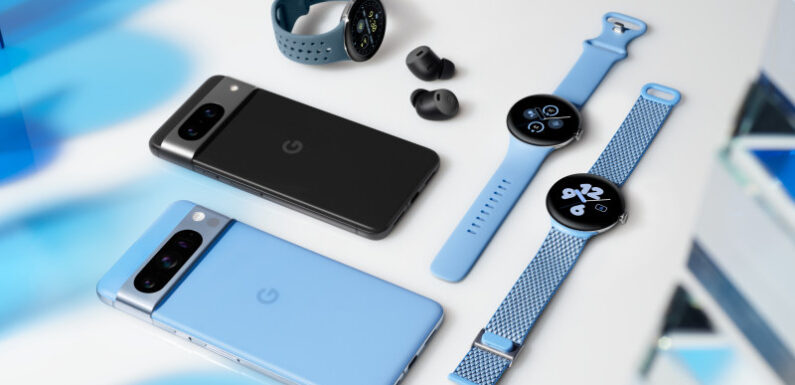
Save articles for later
Add articles to your saved list and come back to them any time.
Google has unveiled its latest smartphones and its second-generation watch, emphasising their expanded AI power and improved battery life, at its annual Made by Google event in New York.
The Pixel 8 and Pixel 8 Pro phones are powered by a new chip called the Google Tensor 3, which the company said can run machine learning models 10 times more complex than the original Tensor, making for improvements in everything from photo and video editing to removing background sound from the other person’s audio during a phone call.
Google’s special colour for this year is a sky blue it calls Bay.
Google also said both phones had hit an average battery life of 31 hours during testing, and could last up to 72 hours with the battery-saving mode on.
The devices, like other recent American gadgets including the latest iPhones, have seen a significant price increase in Australian dollars since last year. The Pixel 8 will start at $1200, compared to the $1000 of last year’s Pixel 7, while the Pixel 8 Pro gets a $400 bump to $1700. Google will continue to sell this year’s Pixel 7a for $750.
The standard Pixel 8 has a smoother screen, new cameras and more powerful AI.
Both phones have significantly brighter screens, with the standard Pixel 8 coming in a little smaller than last year’s model at 6.2 inches but with a much smoother 120Hz display, and the Pro sticking with the same 6.7-inch size but upgraded to more durable Gorilla Victus 2 glass front and back.
Camera-wise, both phones have a new 50MP main module for better low-light performance and sharper 2x zoom, and while the ultrawide modules differ in specs between the two phones they both now come with autofocus, which enables a super-close macro mode. The Pro additionally carries a 5x telephoto camera, as well as a thermometer sensor that Google said could quickly take the temperature of objects like beverages and cookware.
The Pixel 8 Pro will be getting new video features, and has a temperature sensor.
It wouldn’t be a Pixel reveal without some AI camera features, and this time Google has unveiled something it calls Best Take. The feature kicks in when you snap multiple photos of a group of people, combining the best shot of each individual into a single picture where everyone looks good. Coming in a future update, the new Pixels will also get Magic Editor, which is an expansion of last year’s Magic Eraser feature, as well as a tool that can strip unwanted sounds out of videos.
There will also be some new Pro-specific features dropping in a future update, including HDR+ and advanced colour grading for videos, plus the first-ever Night Sight Video mode for low-light clips.
The phones will come with the expected Pixel perks and features like Call Screen and Google’s own VPN for private browsing, and the company said these models would be supported with updates for at least seven years, up from five years on the Pixel 7.
The Pixel Watch 2 lasts longer, is more powerful and has more accurate stress and heart rate detection.
For the Pixel Watch 2, Google has stuck with the same domed AMOLED display but updated just about everything else. The housing is now aluminum rather than steel, a much more powerful Qualcomm processor replaces the Exynos from the original, and you now get 24 hours of battery life with the display set to always on, whereas previously you needed to turn it off to get that much longevity. The price for the watch has remained the same; $550 for the Wi-Fi version and $650 for 4G.
The included Fitbit health features are expanded by a new multi-path heart-rate sensor that takes several independent estimates during workouts for more accurate tracking, the company said, with automatic detection when you start or stop a workout. A new feature can also detect stress responses by tracking skin temperature, sweat and heart rate, prompting users to log their mood or offering interventions like guided breathing exercises.
Google is also adding to its safety features, which includes fall detection and emergency SOS, by bringing “safety check” over from its phones to the watch. Users schedule a timer and are asked to check in when it finishes, and if they don’t a message is sent to their nominated emergency contacts. It’s meant to provide peace of mind for people walking home after dark, or going for a long cycle.
Finally, Google said it was improving the watch software experience with new apps including Calendar and Gmail, and would let the Google Assistant access certain health data, so you could ask about your workout stats. It’s also adapting the “At a Glance” widget from its phones (which changes contextually throughout the day to show weather, appointments, traffic and more) as a complication for its watch faces.
Get news and reviews on technology, gadgets and gaming in our Technology newsletter every Friday. Sign up here.
Most Viewed in Technology
From our partners
Source: Read Full Article



